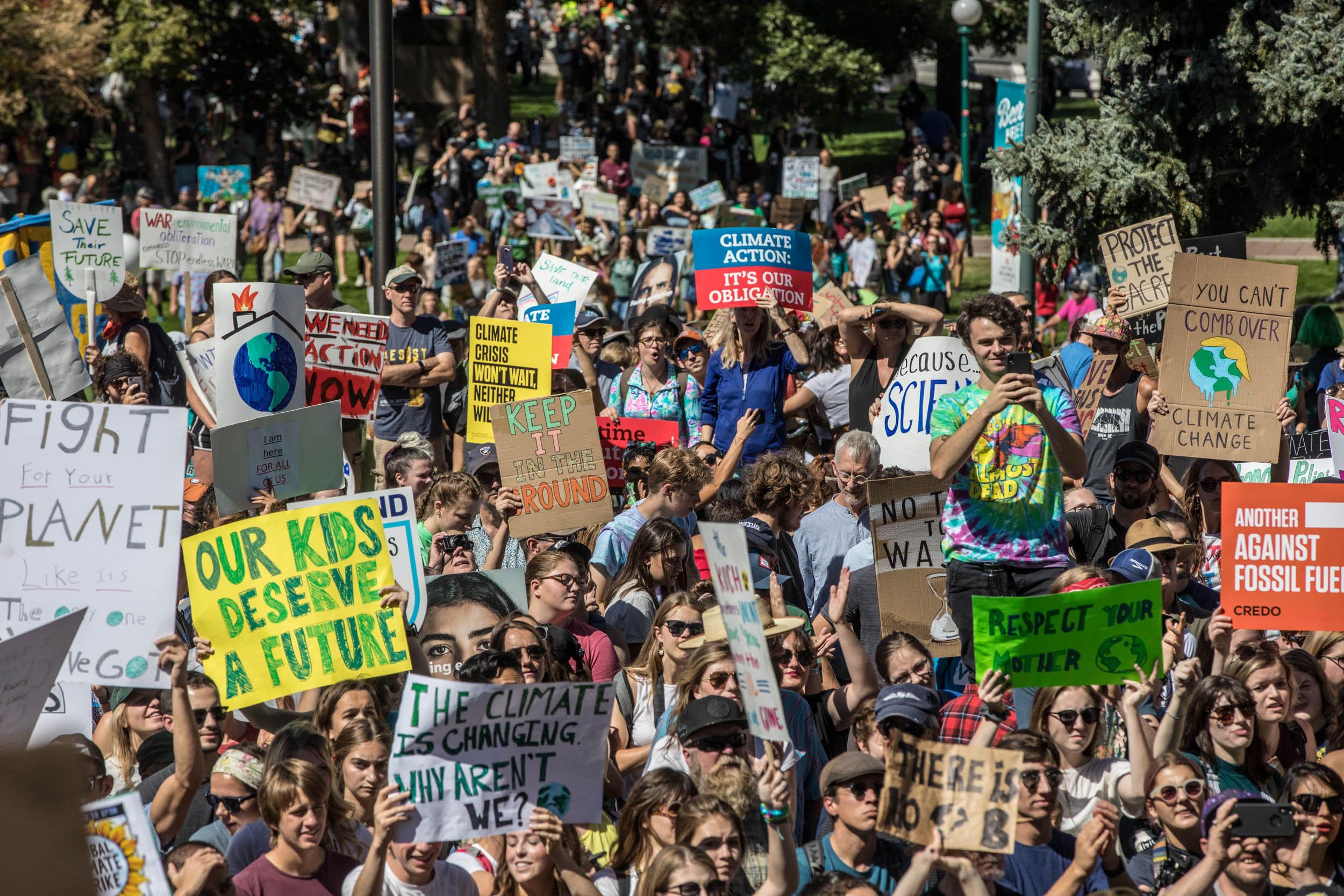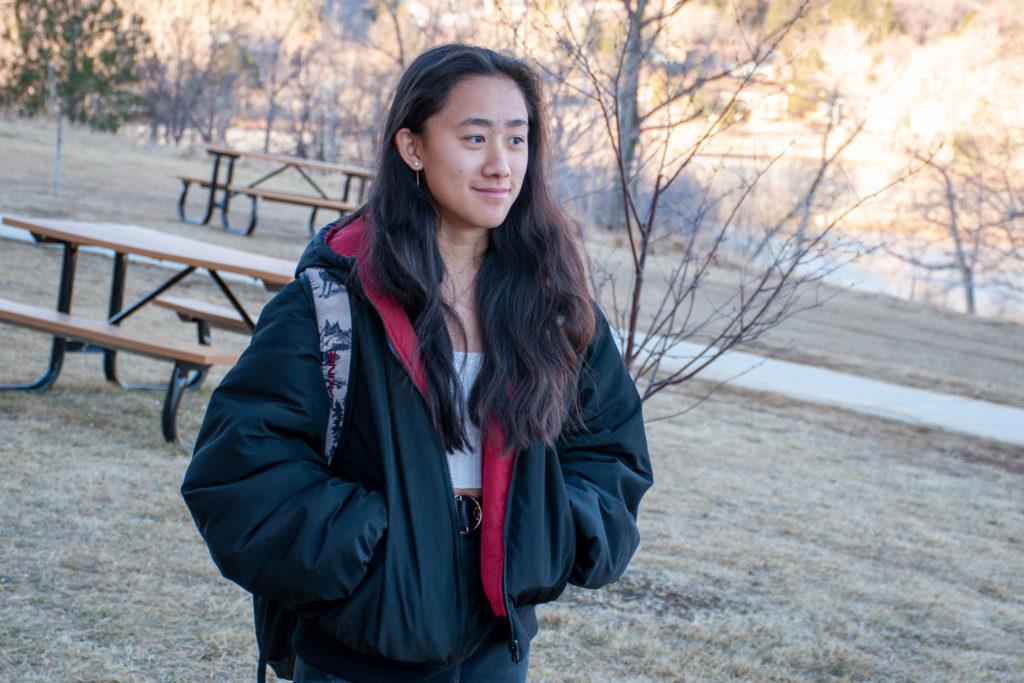
Last fall, thousands of people, mostly young teens, skipped out on their classes and converged on Civic Center Park in Denver to spotlight what they see as a looming cataclysm. They stood with 16-year-old Swedish climate icon Greta Thunberg.
The emotion of it was on display and standing in the crowd you could find a pair of sisters from Centennial, Colorado with handmade signs. One sign read, “I shouldn’t be here. I should be in school.” The other, “Science and climate change don’t care what you believe.”
“It's on my mind every single day, every single day I wake up and I think about it, I research it,” said Barbara Hilton, the older of the two sisters. “I read books on it every single day.”
The warming climate is on the minds of many Coloradans, probably none more so than teens, for whom concern about the planet is layered on top of other major concerns about their futures.
If you need help, dial 988 to reach the Suicide and Crisis Lifeline. You can also reach the Colorado Crisis Services hotline at 1-844-493-8255 or text “TALK” to 38255 to speak with a trained counselor or professional. Counselors are also available at walk-in locations or online to chat.
Barbara’s single-minded focus has caused problems for her.
Her climate angst metastasized as a fear of the future and started to fuel real anxiety. She struggled to focus, frequently bounced to social media for the latest dire dispatches, feeling guilty about not doing more to help and had panic attacks.
It got so bad that she obsessed over things like bee populations and government spying.
“My sleep pattern was all off… you know, I was just in my room,” Hilton said. “It was like every hour I'd start crying over something new. It was quite the spiral, a downward spiral.”
Her mother, Lisa, works with teens with emotional disorders in the Cherry Creek School District. Others in their family have struggled with mental health issues, like depression, but Lisa said her daughter’s struggle with anxiety was beyond the norm.
“It's OK to be sad, that’s what I tell the kids, it’s OK to be angry, but when your mood affects your day-to-day life where you can't function, then it's time to get help or talk to somebody,” she said.
Not all students deal with this problem in the same way.
Rachel Tseng, a Junior at Fairview High School in Boulder and a leader of the school’s Net Zero Club, is also a student climate activist. She faces the usual stresses like studying for the SAT and looking at colleges but feels a keen responsibility to put activism first.
“I don’t want to feel like I’m giving up, like I’m giving in to something that I could probably have control over,” Tseng said.
Senior Fairview student Charlotte Whitney, on the other hand, says she doesn’t do as much as she could to fight climate change. She’s a candidate for the IB Diploma and president of the school’s French National Honor Society. Both commitments are a drag on her activism, she says.

“Sometimes, I have to work on my big history paper, instead of doing some demonstrating,” she said.
Whitney sees an empathy gap with older generations and says the burden of addressing the changing climate has seemed to fall to teens and younger generations. To her, “they should be recognizing that all of these other things are going on: family issues, relationship issues, school, college” and more.
Tseng’s activism gives her a sense of control and personal action, but Whitney has doubts about the effectiveness of that same activism.
“In 2016, I went to the Women's March and I marched and it felt really good to be with all those people marching, but then there was no change,” she lamented. “It’s made me look at any kind of protest in a more cynical sense.”
Both of these students are keenly aware of the threat climate change poses to their generation, despite their differences.
“Not everyone can be Greta Thunberg, you know?” Whitney said, “But, you can try.”
The teens’ doubt, indecision and anxiety sound familiar to a clinical social worker.
Benjamin White is based in Lafayette and was a naturalist before he started helping patients in therapy. While climate is not often a central topic, he said, it’s not uncommon for his clients — whether they be teens or adults — to bring it up in therapy.
“Climate change is absolutely traumatic, I would say… it is causing people significant grief and anxiety and teenagers I think are especially vulnerable to those kinds of feelings as it is,” White said. “And I think it's important that we support them.”
In Barbara’s case, she’d already had some underlying mental health challenges. White said in cases like that, or for those dealing with multiple psychological struggles, a person might be more prone to become hyper-stressed by an evolving crisis like climate change. “And it becomes a focal point, becomes something that causes intense anxiety, intense grief, sort of overwhelming feelings.”
Hilton visited a counselor who diagnosed her as suffering from severe anxiety and prescribed anti-anxiety medication. On top of that, she started to meditate, exercise more and took up sewing. It helped her turn a corner.
“It helps because now my stress and anxiety in regards to everything really is a lot more manageable,” she said.
The other thing Barbara is doing: she’s stayed politically active in tandem with her sister Brooks. Both say it is uplifting to join climate rallies, like the one last fall, and speak out with thousands of other young Coloradans.
Climate change might be scary, Brooks said, but “it also is hopeful knowing that there [are] other people in my community and around the world who want to change it.”
People like Fairview’s Rachel Tseng. She understands the difficulty of activism, yet, her biggest motivator is when she sees her work pay off.
“I think that when you try to do something, or you see that something else is being done, that changes your perspective,” Tseng said. “I do understand, it’s so heavy.”










